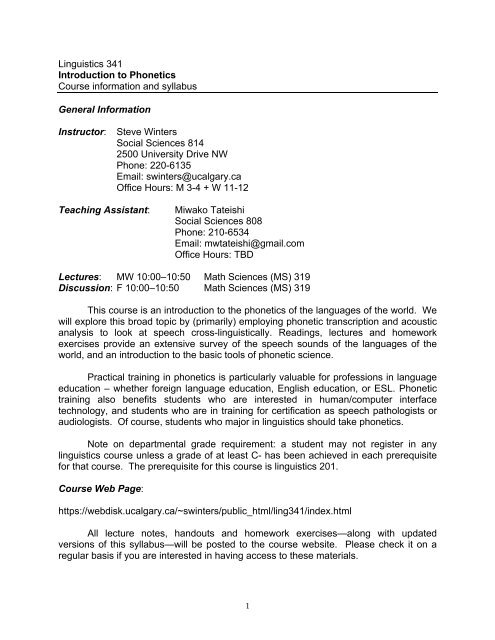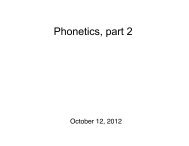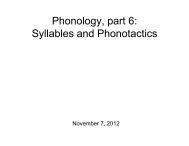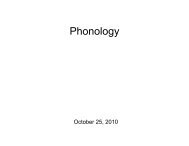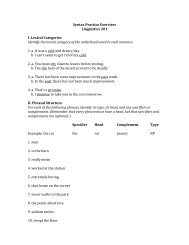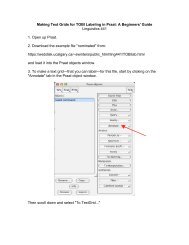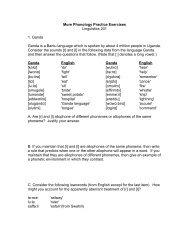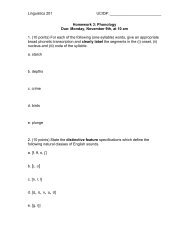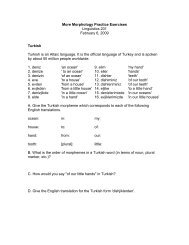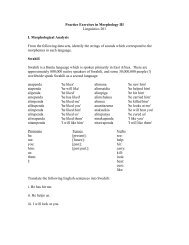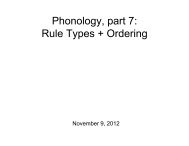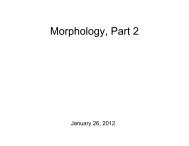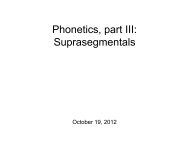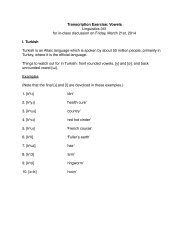Linguistics 341 Introduction to Phonetics Course information and ...
Linguistics 341 Introduction to Phonetics Course information and ...
Linguistics 341 Introduction to Phonetics Course information and ...
Create successful ePaper yourself
Turn your PDF publications into a flip-book with our unique Google optimized e-Paper software.
<strong>Linguistics</strong> <strong>341</strong><strong>Introduction</strong> <strong>to</strong> <strong>Phonetics</strong><strong>Course</strong> <strong>information</strong> <strong>and</strong> syllabusGeneral InformationInstruc<strong>to</strong>r:Steve WintersSocial Sciences 8142500 University Drive NWPhone: 220-6135Email: swinters@ucalgary.caOffice Hours: M 3-4 + W 11-12Teaching Assistant:Miwako TateishiSocial Sciences 808Phone: 210-6534Email: mwtateishi@gmail.comOffice Hours: TBDLectures: MW 10:00–10:50 Math Sciences (MS) 319Discussion: F 10:00–10:50 Math Sciences (MS) 319This course is an introduction <strong>to</strong> the phonetics of the languages of the world. Wewill explore this broad <strong>to</strong>pic by (primarily) employing phonetic transcription <strong>and</strong> acousticanalysis <strong>to</strong> look at speech cross-linguistically. Readings, lectures <strong>and</strong> homeworkexercises provide an extensive survey of the speech sounds of the languages of theworld, <strong>and</strong> an introduction <strong>to</strong> the basic <strong>to</strong>ols of phonetic science.Practical training in phonetics is particularly valuable for professions in languageeducation – whether foreign language education, English education, or ESL. Phonetictraining also benefits students who are interested in human/computer interfacetechnology, <strong>and</strong> students who are in training for certification as speech pathologists oraudiologists. Of course, students who major in linguistics should take phonetics.Note on departmental grade requirement: a student may not register in anylinguistics course unless a grade of at least C- has been achieved in each prerequisitefor that course. The prerequisite for this course is linguistics 201.<strong>Course</strong> Web Page:https://webdisk.ucalgary.ca/~swinters/public_html/ling<strong>341</strong>/index.htmlAll lecture notes, h<strong>and</strong>outs <strong>and</strong> homework exercises—along with updatedversions of this syllabus—will be posted <strong>to</strong> the course website. Please check it on aregular basis if you are interested in having access <strong>to</strong> these materials.1
TextbookPeter Ladefoged <strong>and</strong> Keith Johnson (2011), A <strong>Course</strong> in <strong>Phonetics</strong>, 6 th ed. Bos<strong>to</strong>n:Wadsworth.Henning Reetz <strong>and</strong> Allard Jongman (2009), <strong>Phonetics</strong>: Transcription, Production,Acoustics <strong>and</strong> Perception, Chichester, UK: Wiley/Blackwell.Both of these textbooks are optional (but highly recommended!) for this course. Anyfurther readings will be announced <strong>and</strong> made available during the course of thesemester.Discussion sessionsIt is relatively easy <strong>to</strong> learn the basic principles of phonetics (<strong>and</strong> phonetictranscription), but you will only become better at working with those principles throughpractice. Lots <strong>and</strong> lots of practice. Therefore, each Friday will be devoted <strong>to</strong> a review<strong>and</strong> application of the material covered during the lecture sections that week. Duringthese discussion sessions you will have an opportunity <strong>to</strong> practice your skills at phonetictranscription, work on in-class phonetic analysis projects, <strong>and</strong> <strong>to</strong> discuss the assignedreading(s) for that week.GradingThe course grade will be based on your performance on homework exercises,production exercises, a production exam, course participation, a midterm exam <strong>and</strong> afinal exam.Homework will consist primarily of transcription practice <strong>and</strong> acoustic analysisexercises. I will expect you <strong>to</strong> complete these assignments independently, outside ofclass, as they will be graded for credit. Materials for the transcription exercises will bemade available from the course website. These assignments are labeled as (HW) in thecourse schedule given below. Late homeworks will only be accepted in cases ofdocumented medical or family emergencies.Production Exercises. Over the course of the semester, you will be expected <strong>to</strong>learn how <strong>to</strong> produce the various sounds of the International Phonetic Alphabet. I willassign production exercises <strong>to</strong> test your ability <strong>to</strong> produce the sounds that have beenpresented in class. These assignments are labeled as (PEX) in the course schedulegiven below. You will be responsible for making recordings of yourself producing thesesounds <strong>and</strong> sending the sound files <strong>to</strong> me for grading purposes. If you do not own acomputer with which you can record yourself, you may use the facilities of the <strong>Phonetics</strong>Lab (see below) <strong>to</strong> do so.I will provide you with more details regarding the production exam as thesemester proceeds.2
Participation grades will primarily be based on the completion of assignments in<strong>and</strong> for each Friday discussion section. These assignments are labeled as (TREX) inthe course schedule below. Since these assignments will be discussed in class, pointswill not be taken off if honest (independent) effort yielded incorrect results. However,points will be taken off if an assignment is incomplete or carelessly done.In borderline cases, class participation in the traditional sense may be used whenassigning final grades.Exams. The final exam will be cumulative. Make-up exams will not be givenexcept in the case of dire, documented medical emergencies.These components of the coursework will be weighted as follows in determining yourfinal grade:Homework exercises (HW): 15%Production exercises (PEX): 15%Participation (TREX): 15%Midterm exam: 25%Final exam: 25%Production exam: 5%The grading scale for the course will be as follows:97% < A+ 71 < C+ < 7592 < A < 97 66 < C < 7188 < A- < 92 62 < C- < 6684 < B+ < 88 58 < D+ < 6279 < B < 84 50 < D < 5875 < B- < 79 F < 50Please note that I do not round up in calculating final grades.Resources1. The Department of <strong>Linguistics</strong> <strong>Phonetics</strong> Lab is located in Education 259 (phone:220-3598). The lab is set up <strong>to</strong> make high quality acoustic recordings of speech, whichyou are more than welcome <strong>to</strong> use for your production exercises for this class. If youwould like <strong>to</strong> use the resources of the <strong>Phonetics</strong> Lab at any time, please contact me orthe TA <strong>to</strong> set up an appointment.2. Sound files <strong>and</strong> exercises from A <strong>Course</strong> in <strong>Phonetics</strong> (one of the textbooks for thisclass), may be found on the web at:http://www.phonetics.ucla.edu/course/contents.html3
3. Additionally, helpful sound materials may be found here:http://www.phonetics.ucla.edu/vowels/contents.html4. Doulos SIL is a freely available phonetics font for your computer. You may downloadit from this weblink:http://scripts.sil.org/cms/scripts/page.php?site_id=nrsi&id=DoulosSIL_downloadAlthough it is not necessary <strong>to</strong> do so, you are encouraged <strong>to</strong> use your computer—<strong>and</strong>this font—in writing up homework assignments for this class.Other IPA fonts (for Windows <strong>and</strong> Mac) respectively, can be found here:http://www.davidmontero.net/<strong>Linguistics</strong>.phphttp://www.blugs.com/IPA/5. Praat is a great software package for phonetic analysis. Among (many) other things,you may use Praat <strong>to</strong> record, edit <strong>and</strong> play sound files on your computer. You will need<strong>to</strong> download Praat <strong>to</strong> complete many of the exercises in this class; you can get it for freehere:http://www.fon.hum.uva.nl/praat/6. The University of Calgary <strong>Phonetics</strong> Club meets on a weekly basis <strong>to</strong> read <strong>and</strong>discuss recently published papers in phonetics, or <strong>to</strong> listen <strong>to</strong> presentations by clubmembers on their ongoing research. If you are interested in learning more about currentresearch in phonetics, you are welcome <strong>to</strong> attend club meetings, which are usually heldin either the phonetics lab or the linguistics seminar room. Contact me atswinters@ucalgary.ca for specific meeting times <strong>and</strong> details.7. Just for (educational) fun: I have a homemade IPA Scrabble set, which you arewelcome <strong>to</strong> borrow at any time. All you have <strong>to</strong> do is ask!Additional resources in the main libraryThe following books, in the main library, may be of use in providing a deeperperspective on the materials covered in this course.• Borden, G. J. (1984) Speech Science Primer, 3rd ed. [QP306.B65 1984]• Johnson, K.A. (2003) Acoustic & Audi<strong>to</strong>ry <strong>Phonetics</strong>, 2 nd ed. [P221.5.J64 2003]• Ladefoged, P. (1996). Elements of Acoustic <strong>Phonetics</strong>, 2nd ed. [QP306.L33 1996]• Ladefoged, P. & Maddieson, I. (1995) Sounds of the World's Languages [P221.L3151995]• Pullum, G.K. (1996) Phonetic Symbol Guide, 2nd Ed. [P221.P85 1996] (in the library'sreference section)4


